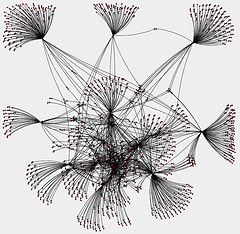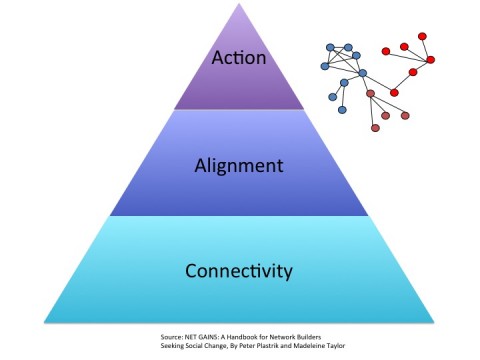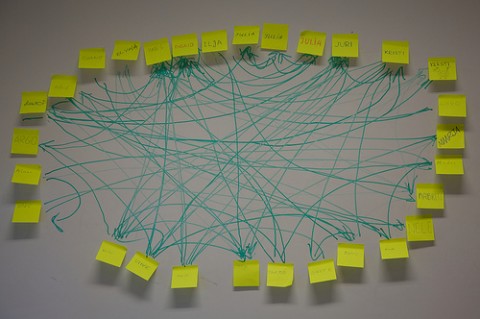July 10, 2014
“In spite of current ads and slogans, the world doesn’t change one person at a time. It changes as networks of relationships form among people who discover they share a common cause and vision of what’s possible.”
-Margaret Wheatley and Deborah Frieze (2006)

For the past two years, I’ve had the fortune of partnering with Carole Martin to create and deliver a network leadership development program for regional and economic development in “the north country” (northern NH, southern Quebec, eastern VT). This opportunity was made possible by funding from the Neil and Louise Tillotson Foundation and took the form of something we called the Community Practitioners Network (CPN). Subsequently, some of the members of the first cohort have taken to calling it the “Community Placemakers Network” (more on that another time).
One of the first steps Carole and I took in creating the program was to begin with a set of principles, which, in good network fashion, evolved over time. These principles guided our design and facilitation of the program as it emerged, and we offered them to and co-evolved them with the cohort as they considered how to bring them to their own leadership in their organizations, communities, and beyond. Here is a condensed version of the lastest iteration of the principles:
- Look for what is beyond the immediate sight lines and intersections – Part of the power of networks is emergence; expect and delight in the unexpected that comes from the meeting of different minds and perspectives.
- Design for serendipity – Don’t try to control and account for all outcomes. First of all, it’s impossible. Secondly, as Andrew Goldsworthy once said, “Too much control can kill a work.”
- Periphery, not (just) center – Network action is not simply about what is happening “in the room” but what transpires “after the meeting,” not what goes on at a “steering group” level, but what happens in two-sies and three-sies that form/partner/innovate “out there.”
- Process sometimes counts as action – Creating stronger connections and building alignment among network members/participants can be significant progress.
- We move at the speed of trust – Make time and space for trust to be built.
- Contribution before credential – Contributions are what count, and can come from anyone.
- Feed the network through questions so that it has a life of its own – Using inquiry can help to unlock network potential in the pursuit of unique and context-specific answers.
Always eager to hear others and how you have put them to use . . .
June 26, 2014

Picking up on the spirit of yesterday’s post about asking “beautiful questions” and inspired by a staff challenge to articulate lines of inquiry stemming from IISC’s core lenses, I offer this post. It distills some of the underlying questions that adopting a “network lens” inspires for social change work. Please add, adjust, edit, and rift!
- How does your organization/network/change initiative strive to add value to (rather than duplicate) existing efforts? What do you do best, and how might you then connect to the rest?
- What are you doing to support and strengthen connections and alignment within and beyond your organization/network/change initiative?
Read More
December 12, 2013
 Over the past five years or so of supporting self-declared “networks” for change, I have evolved in my understanding of what is new when we call something a network, versus a coalition or collaborative or alliance. On the surface, much can look the same, and one might also say that coalitions, collaboratives and alliances are simply different forms of networks. Yes, and . . . I believe that what can make a big difference is when participants in a network (or an organization, for that matter) embrace new ways of seeing, thinking, and doing. So let me propose that network approaches at their best call on us to lead with some of the following: Read More
Over the past five years or so of supporting self-declared “networks” for change, I have evolved in my understanding of what is new when we call something a network, versus a coalition or collaborative or alliance. On the surface, much can look the same, and one might also say that coalitions, collaboratives and alliances are simply different forms of networks. Yes, and . . . I believe that what can make a big difference is when participants in a network (or an organization, for that matter) embrace new ways of seeing, thinking, and doing. So let me propose that network approaches at their best call on us to lead with some of the following: Read More
December 4, 2013
“Ultimately if we are to avoid failure in the most critical work of this century, the deepest reaches of our beings must be brought to bear in honestly reevaluating and shifting the most basic structures of our society.”
– john a. powell

The following is a textual recapturing of a Pecha Kucha-like presentation that I gave at an ARNOVA Pre-Conference Session in Hartford, CT two weeks ago. This was part of a 3-hour interactive conversation, co-designed and facilitated with Dr. Angela Frusciante of the William Caspar Graustein Memorial Fund, focusing on the power of networks for learning and social change, primarily with academic researchers and philanthropists.
At the Interaction Institute for Social Change, we are in agreement with Professor john a. powell when he points to the need to consider and make fundamental structural changes in our country and communities for the causes of greater social justice and sustainability. Read More
September 25, 2013

Our friend Jane Wei-Skillern recently co-wrote (along with Nora Silver and Eric Heitz) another valuable contribution to the growing “network building” body of literature, entitled “Cracking the Network Code: Four Principles for Grantmakers.” This piece is part of Grantmakers for Effective Organizations’ learning initiative, Scaling What Works. While the guide mainly addresses funders, it also has something for those outside of the philanthropic world. Its core offering is a set of principles to guide what the authors call “the network mindset”: Read More
September 4, 2013
“Look to the growing edge!”
– Howard Thurman

|Photo by Derek Keats|http://www.flickr.com/photos/93242958@N00/5975110268/in/photolist-a7117y-emRe8S-dQqpqM-9php24-dQvZtC-8YMYMv-7zavYz-e1zkdz-aLCNuz-9MeCHk-9MfzYB-9MekHF-9Mho3b-89vnnr-9MfG9c-9Mhaow-9D8j3o-9Mehua-9Mh72m-aykWRY-cCSWHs-8MqWXJ-9LFCBt-9MiH7w-9Mh12x-93HasG-azHpQX-aXCs8V-ejaBn1-byQPHp-bkVXyG-byQQ5x-byQPJv-bkVXGC-bkVXGo-a6ZZM9-a6ZZzU-a6ZZqY-8NyJ6R-8NywQV-8NBWXy-8NysTX-8NBpXW-8NC1BU-8Nz18e-a6X98i-a6ZZ7U-8NyEJB-bkVXoL-bkVXwG-byQPMZ|
Edge has its advantages. This is the finding of ecologists and other scientists looking at how peripheral spaces can provide adaptive strength. For example, where different habitats meet, there is considerable fecundity and the extent to which there is more significant overlap there is that much more richness and species able to thrive in more than one setting. Trees make interesting use of edge by maximizing the surface area of their root systems to find and take in nutrients in the soil. We also know that innovation tends to happen where different disciplinary fields meet, and therefore through a porousness and openness to new thinking on the edge. Read More
May 22, 2013

I am just coming from a convening of the Northern New England Networks Community of Practice in Crawford Notch, New Hampshire. The theme of the gathering was “Power and Networks,” and very timely in that a few network building initiatives with which I am working are reaching a fever pitch in terms of working out issues of power and privilege. Borrowing from something my IISC colleague Cynthia Silva Parker has said in the past, while power is always at the table, now it’s on the table! And I wanted to share some of the gleanings from the overall session. Read More
February 15, 2012

|Photo by Hans Poldoja|
Last week I was privileged to attend a gathering of practitioners from across sectors to discuss the successes and challenges of working in networked ways. The Northern New England Network Community of Practice met in Portsmouth, NH for a full day of conversations facilitated by members of Maine Network Partners. Throughout the day many critical questions were raised about and stemming from net work. No one pretended to necessarily have all of the answers to these, or to imagine that what works in one case will necessarily work in another. Nonetheless, we look forward to exploring any patterns that do show up across experiences in our respective network efforts, whether we are talking small or large scale, local or regional, within a sector or across sectors . . . Read More



 Over the past five years or so of supporting self-declared “networks” for change, I have evolved in my understanding of what is new when we call something a network, versus a coalition or collaborative or alliance. On the surface, much can look the same, and one might also say that coalitions, collaboratives and alliances are simply different forms of networks. Yes, and . . . I believe that what can make a big difference is when participants in a network (or an organization, for that matter) embrace new ways of seeing, thinking, and doing. So let me propose that network approaches at their best call on us to lead with some of the following:
Over the past five years or so of supporting self-declared “networks” for change, I have evolved in my understanding of what is new when we call something a network, versus a coalition or collaborative or alliance. On the surface, much can look the same, and one might also say that coalitions, collaboratives and alliances are simply different forms of networks. Yes, and . . . I believe that what can make a big difference is when participants in a network (or an organization, for that matter) embrace new ways of seeing, thinking, and doing. So let me propose that network approaches at their best call on us to lead with some of the following: 



